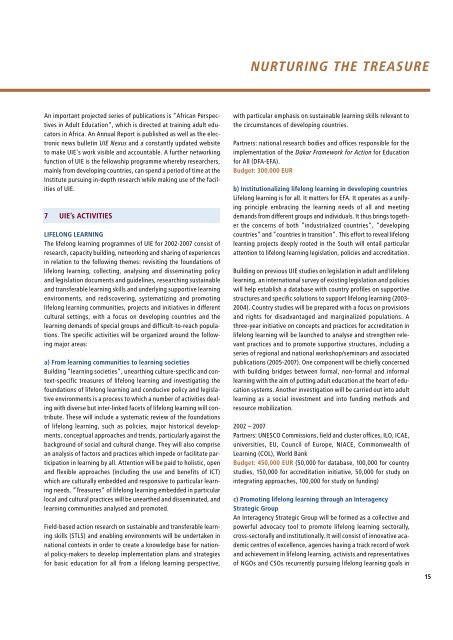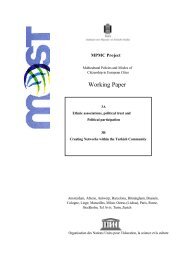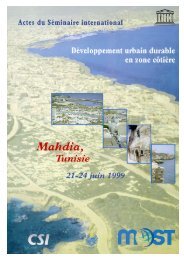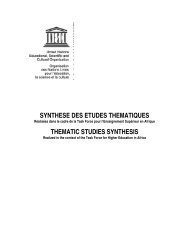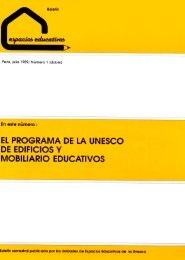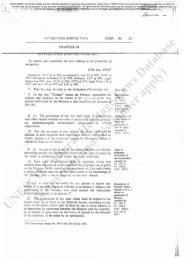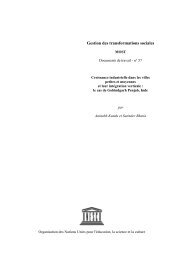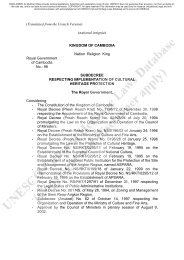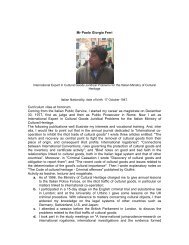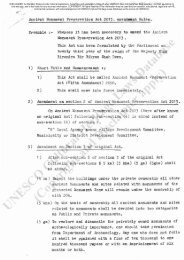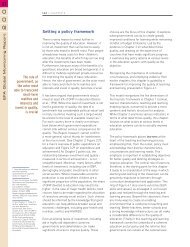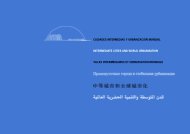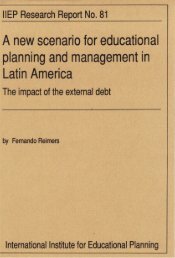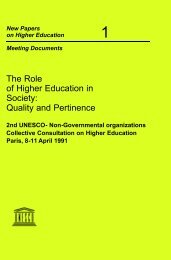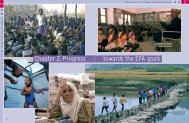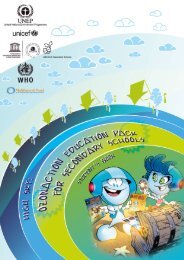NURTURING THE TREASURE NURTURING THE ... - Unesco
NURTURING THE TREASURE NURTURING THE ... - Unesco
NURTURING THE TREASURE NURTURING THE ... - Unesco
Create successful ePaper yourself
Turn your PDF publications into a flip-book with our unique Google optimized e-Paper software.
<strong>NURTURING</strong> <strong>THE</strong> <strong>TREASURE</strong><br />
An important projected series of publications is ”African Perspectives<br />
in Adult Education”, which is directed at training adult educators<br />
in Africa. An Annual Report is published as well as the electronic<br />
news bulletin UIE Nexus and a constantly updated website<br />
to make UIE's work visible and accountable. A further networking<br />
function of UIE is the fellowship programme whereby researchers,<br />
mainly from developing countries, can spend a period of time at the<br />
Institute pursuing in-depth research while making use of the facilities<br />
of UIE.<br />
7 UIE’s ACTIVITIES<br />
LIFELONG LEARNING<br />
The lifelong learning programmes of UIE for 2002-2007 consist of<br />
research, capacity building, networking and sharing of experiences<br />
in relation to the following themes: revisiting the foundations of<br />
lifelong learning, collecting, analysing and disseminating policy<br />
and legislation documents and guidelines, researching sustainable<br />
and transferable learning skills and underlying supportive learning<br />
environments, and rediscovering, systematizing and promoting<br />
lifelong learning communities, projects and initiatives in different<br />
cultural settings, with a focus on developing countries and the<br />
learning demands of special groups and difficult-to-reach populations.<br />
The specific activities will be organized around the following<br />
major areas:<br />
a) From learning communities to learning societies<br />
Building ”learning societies”, unearthing culture-specific and context-specific<br />
treasures of lifelong learning and investigating the<br />
foundations of lifelong learning and conducive policy and legislative<br />
environments is a process to which a number of activities dealing<br />
with diverse but inter-linked facets of lifelong learning will contribute.<br />
These will include a systematic review of the foundations<br />
of lifelong learning, such as policies, major historical developments,<br />
conceptual approaches and trends, particularly against the<br />
background of social and cultural change. They will also comprise<br />
an analysis of factors and practices which impede or facilitate participation<br />
in learning by all. Attention will be paid to holistic, open<br />
and flexible approaches (including the use and benefits of ICT)<br />
which are culturally embedded and responsive to particular learning<br />
needs. ”Treasures” of lifelong learning embedded in particular<br />
local and cultural practices will be unearthed and disseminated, and<br />
learning communities analysed and promoted.<br />
Field-based action research on sustainable and transferable learning<br />
skills (STLS) and enabling environments will be undertaken in<br />
national contexts in order to create a knowledge base for national<br />
policy-makers to develop implementation plans and strategies<br />
for basic education for all from a lifelong learning perspective,<br />
with particular emphasis on sustainable learning skills relevant to<br />
the circumstances of developing countries.<br />
Partners: national research bodies and offices responsible for the<br />
implementation of the Dakar Framework for Action for Education<br />
for All (DFA-EFA).<br />
Budget: 300,000 EUR<br />
b) Institutionalizing lifelong learning in developing countries<br />
Lifelong learning is for all. It matters for EFA. It operates as a unifying<br />
principle embracing the learning needs of all and meeting<br />
demands from different groups and individuals. It thus brings together<br />
the concerns of both ”industrialized countries”, ”developing<br />
countries” and ”countries in transition”. This effort to reveal lifelong<br />
learning projects deeply rooted in the South will entail particular<br />
attention to lifelong learning legislation, policies and accreditation.<br />
Building on previous UIE studies on legislation in adult and lifelong<br />
learning, an international survey of existing legislation and policies<br />
will help establish a database with country profiles on supportive<br />
structures and specific solutions to support lifelong learning (2003-<br />
2004). Country studies will be prepared with a focus on provisions<br />
and rights for disadvantaged and marginalized populations. A<br />
three-year initiative on concepts and practices for accreditation in<br />
lifelong learning will be launched to analyse and strengthen relevant<br />
practices and to promote supportive structures, including a<br />
series of regional and national workshop/seminars and associated<br />
publications (2005-2007). One component will be chiefly concerned<br />
with building bridges between formal, non-formal and informal<br />
learning with the aim of putting adult education at the heart of education<br />
systems. Another investigation will be carried out into adult<br />
learning as a social investment and into funding methods and<br />
resource mobilization.<br />
2002 – 2007<br />
Partners: UNESCO Commissions, field and cluster offices, ILO, ICAE,<br />
universities, EU, Council of Europe, NIACE, Commonwealth of<br />
Learning (COL), World Bank<br />
Budget: 450,000 EUR (50,000 for database, 100,000 for country<br />
studies, 150,000 for accreditation initiative, 50,000 for study on<br />
integrating approaches, 100,000 for study on funding)<br />
c) Promoting lifelong learning through an Interagency<br />
Strategic Group<br />
An Interagency Strategic Group will be formed as a collective and<br />
powerful advocacy tool to promote lifelong learning sectorally,<br />
cross-sectorally and institutionally. It will consist of innovative academic<br />
centres of excellence, agencies having a track record of work<br />
and achievement in lifelong learning, activists and representatives<br />
of NGOs and CSOs recurrently pursuing lifelong learning goals in<br />
15


